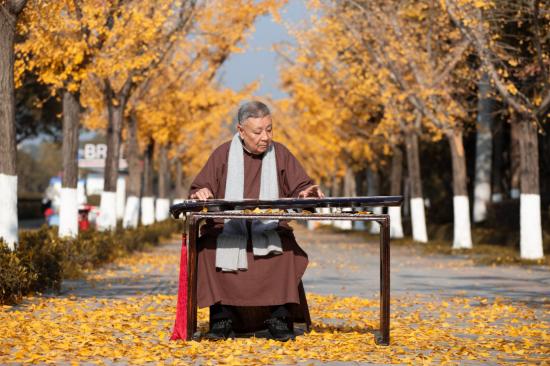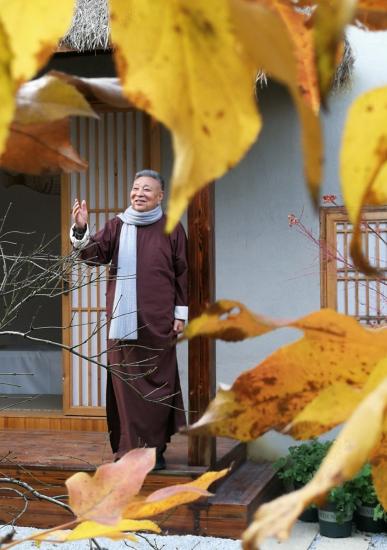Huang Deyuan, inheritor of the intangible cultural heritage "Zhejiang Guqin" and "Wenzhou Dialect"
Calligraphy and peony painting are performed in the morning, and Guqin is played and recited in the afternoon. This is what he does every day in a hurry. Some people say that his "life calendar" has not changed for decades, which is too boring; some people don't understand why he still insists on spending hours every day playing the guqin, painting, and reciting, and nothing falls behind.
"I'm not tired at all. I enjoy a poetic life every day. Playing the qin and reciting these traditional intangible cultural heritages are the best way to keep healthy." The 78-year-old calligrapher and painter, inheritor of the Zhejiang-style guqin of the intangible cultural heritage in Wenzhou, Wenzhou Chanting Huang Deyuan, the inheritor of non-genetic inheritance, took out his new book "Dazhentang Qin Painting and Calligraphy" in the art gallery, and chatted with reporters how he walked on the road of qin, calligraphy and painting.

Do you know a guqin
Embark on the path of learning
Seven strings are good friends, and two ears are bosom friends. Huang Deyuan fell in love with erhu, sanxian, pipa and other musical instruments when he was seven or eight years old, and fell in love with Guqin when he was 11 years old. He was playing erhu at a relative's house, and when he met an elder who was in the guqin business, he asked him softly: Do you know guqin? Do you know the timbre of guqin "subtle, subtle, round and smooth"? Knowing or not, Huang Deyuan became interested in Guqin. In July 1955, with the support and help of his grandfather, he brought the "six kinds" gifts from Wenzhou to Hangzhou, where he learned the guqin from Xu Yuanbai, a master of guqin art from Zhejiang school. After Mr. Xu Yuanbai's death, he continued to learn Guqin with Xu Yuanbai's wife.
The sound of the guqin hides the story. After mastering the playing skills of guqin, Huang Deyuan never put down the guqin again. He traveled to Shanghai, Nanjing, Beijing and other places successively to communicate with pianists from all over the country and constantly improve his qin skills.
When he played the guqin, he did not stick to the ancient qin method, and even innovated the fingering method of playing. For example, he adapted the Guqin piece "Three Die of Yangguan" to make it more perfect. Often, after playing the qin, Mr. Huang would feel a lack of confidants and loneliness, so he thought of teaching the guqin.
When teaching Guqin, he found that there were no etudes in traditional Guqin teaching, so he figured out a method of "rehearsing with songs", and used classic and short pieces such as "Guan Shanyue" and "Junk Crazy" as students to practice fingering. 's tracks. He also wrote the article "Man Talking Guqin", focusing on "Man Talking", explaining in simple terms what is the way of the qin, how the skills of playing the guqin and the artistic conception of the tune are integrated, so that guqin lovers can deeply appreciate the kind of music that the guqin brings to people. Emotion, a state.
With more and more students, in 2008, he led the establishment of the Wenzhou Guqin Association. At that time, only a dozen people in Wenzhou could actually play the guqin, but now there are thousands of guqin lovers in Wenzhou.
Huang Deyuan, inheritor of the intangible cultural heritage "Zhejiang Guqin" and "Wenzhou Dialect"

One "change" and the other "familiar"
Fully display the talent of calligraphy, painting and chanting
Huang Deyuan's talent in painting and reciting was unintentionally discovered.
Regarding learning calligraphy and painting, Huang Deyuan emphasized the word "change". In 1959, Huang Deyuan, who graduated from junior high school, originally wanted to learn Chinese medicine with Xu Jinhou, a famous doctor in Wenzhou, who was called "Dongou Talent" at the time, according to his father's wishes. However, Mr. Xu Jinhou accidentally discovered his talent for calligraphy and painting, and bluntly told him to change to calligraphy and painting. Mr. Xu Jinhou was a student of Wang Ruyuan, the pioneer of the Yongjia School of Painting, as well as a teacher of Liu Danzhai, a calligrapher and painter.
Mr. Xu Jinhou talked to Huang Deyuan's father and asked Huang Deyuan to abandon medicine and pursue painting and calligraphy. Since 1980, Huang Deyuan has specialized in peony painting. While inheriting the characteristics of Yongjia School of Painting, he made breakthroughs in the techniques of creating peony, including ink wash, color ink, light ink, heavy color, etc., highlighting the grace and elegance of peony.
In addition, with regard to the recitation of Wenzhou dialect, Huang Deyuan mentioned the four words "dark eyes and ears". His mother and uncle both studied at the Mengguan private school. In particular, his little uncle was the best reciter in the school at that time, and naturally he buried the seed of Wenzhou dialect recitation in his heart. Slowly, the seed took root.
In 2012, the team of Xu Jianshun, a professor of Minzu University of China and secretary-general of the Chinese Recitation Society, conducted interviews and recordings of Chinese recitations across the country, and organized them. When they listened to the Wenzhou dialect recitation recorded by Huang Deyuan, they were very surprised and recorded it three times. In 2014, Huang Deyuan was named the intangible inheritor of Wenzhou chanting.
For so many years, peony paintings and Wenzhou dialect recitation have always accompanied him, and he often said to others: "I am often labeled as a lover of Wenzhou dialect recitation when painting. This label is really good, Makes me feel good, very relaxed.”
love in art gallery
Regular charity classes
The piano has a voice, and love has an echo. When guqin, calligraphy and painting, and Wenzhou dialect recitation made Huang Deyuan feel happy, he also passed on this happiness to more people. He has set up public welfare classes in Wenzhou Workers' Cultural Palace and Yongjia Qin Studies Association, either teaching Guqin, or teaching calligraphy, painting and recitation.
In order to make more young people fall in love with Guqin, he also catches up with the trend and learns the online live broadcasts that young people love. Teach Guqin lovers all over the country how to play Guqin for free through the most accessible online live broadcast.
Huang Deyuan's persistence in inheriting Guqin and Wenzhou dialect recitation deeply moved his students. This year, his students spent more than 100 days building the Huang Deyuan Art Museum, which is full of antique charm.
"Mr. Huang Deyuan has been talking to us. Although this art museum is named after him, he hopes that this art museum is an art museum that belongs to everyone and is an art museum with a public welfare nature. Remember that Mr. Huang Deyuan's students are in the group. Lifa's proposal to build an art museum raised more than 1 million yuan in the afternoon. After the art museum is completed, it will open its doors to those who love Guqin, calligraphy and painting, and Wenzhou dialect recitation, and regularly conduct public welfare classes." The person in charge of Huang Deyuan Art Museum said The reporter introduced.
"Building the art museum in the community is a beautiful bloom of the 'flower of intangible cultural heritage' in the community. It attracts more people to experience the unique charm of intangible cultural heritage at their doorstep, and feel how the guqin, Wenzhou dialect recitation, and painting and calligraphy fly in.' Ordinary people's home'." Citizen Ms. Chen, while visiting the art museum, took pictures and sent them to the circle of friends, so that friends remember to check in.
At the end of the interview, one of Huang Deyuan’s students told the reporter: Today, the most favorite thing for Mr. Huang Deyuan is to call and recite in the art gallery with friends and students; ...The love of his life is in the guqin, calligraphy and painting, Wenzhou dialect recitation, and intangible cultural heritage...
 渝公网安备 50010702504639号
渝公网安备 50010702504639号